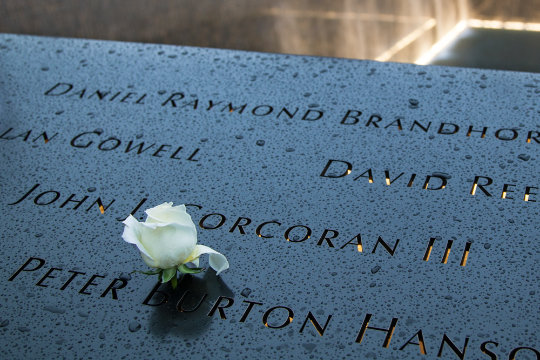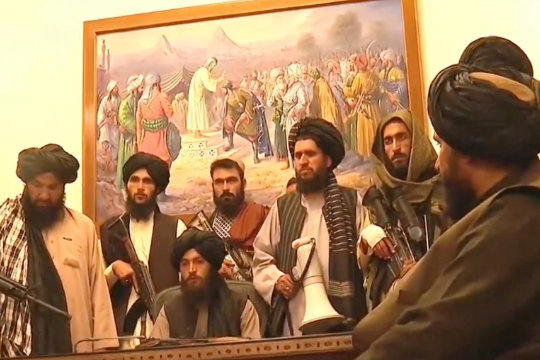| September 10, 2021 | dri.thediplomat.com |
| 9/11: Two Decades Later | ||||||||
|
Welcome to the newsletter of Diplomat Risk Intelligence, the research and consulting division of The Diplomat, your go-to outlet for definitive analyses from and about the Asia-Pacific. This week’s DRI Asia Review looks at the 9/11 attacks in the United States, two decades after they upended geopolitics in West and South Asia. We recommend six movies and television shows around the events leading up to 9/11, and the momentous ones that followed. Through monitoring Bengali news media in both the Indian state of West Bengal and Bangladesh, we summarize what leading voices are saying about the return of the Taliban to Kabul. We give you some of the key conclusions in a new DRI report about Afghanistan and Taliban 2.0, and remind you of the importance of the availability heuristic. | ||||||||
9/11 Through Films and Shows: Six Recommendations | ||||||||
| — Flickr, John Cunniff | ||||||||
A character in “Le Petit Soldat”, a 1963 Jean-Luc Godard movie around the Algerian war, famously said: “Photography is truth. The cinema is truth twenty-four times per second.” Twenty years after the attacks on 9/11, it is interesting to ask to what extent the events of that fateful Tuesday morning seeped into films and television – and how movies and shows sought to depict them, the events bookending the al-Qaida attacks, as well as the murky politics of the Middle East that provided the crucible for the rise of global Islamist terrorism. Zero Dark Thirty In many ways, Oscar-winning Zero-Dark Thirty, a 2012 movie about the hunt for al-Qaida leader Osama bin Laden, remains the quintessential 9/11 movie as it races through momentous events that followed the 9/11 attacks: adoption of torture as a matter of U.S. government policy, black sites, the centrality of Pakistan in how events before and after the attacks unfolded – and above all, the painstaking work that went into uncovering bin Laden’s hiding place in Abbottabad. The makers of Zero Dark Thirty enjoyed unprecedented access to the Central Intelligence Agency (CIA), to the point that the movie triggered two internal CIA enquiries about possible improper behavior among Agency employees who cooperated with director Kathryn Bigelow and screenplay author Mark Boal. The Looming Tower Based on Lawrence Wright’s Pulitzer-winning book “The Looming Tower: Al-Qaeda and the Road to 9/11,” the 2018 Amazon Prime miniseries traces the history leading up to 9/11, zeroing in on the exceptionally hostile relationship between the CIA and the Federal Bureau of Investigation (FBI) when it came to the former sharing intelligence with the latter. The show focuses on three key characters: FBI Special Agent Ali Soufan, his boss John O’Neill, and the head of the CIA’s bin Laden unit, Michael Scheuer (whose name was changed in the show to “Martin Schmidt”). Engaging, but in parts self-serving – Soufan was a producer of the show – the miniseries is a must-watch for the younger, post-9/11 generation who want an accurate but gripping rundown of history. Charlie Wilson’s War Based on CBS producer George Crile’s book on how the United States secretly armed the Afghan mujahideen in the 1980s, the movie is darkly hilarious, and (at the expense of historical accuracy) seeks to portray the late Congressman Charles Wilson as the principal actor behind the United States’ covert counter-Soviet thrust in Afghanistan. The late Phillip Seymour Hoffman plays Gust Avrakotos, a CIA officer responsible for arming the mujahideen and Wilson’s point man in the agency, with much flair. And – this is deliciously ironic – an Indian actor, Om Puri, plays Pakistani dictator and the U.S. Cold War ally Muhammad Zia-ul-Haq. Fair Game The American invasion of Iraq in 2003 will go down in history as one of the greatest blunders of U.S. foreign policy in the post-9/11 era and one of the original sins that led to the return on the Taliban to Kabul last month. “Fair Game,” based on CIA officer Valerie Plame and her husband the U.S. diplomat Joseph C. Wilson, looks at how the Bush administration cooked up intelligence around Saddam Hussein’s weapons of mass destruction program to justify its decision to go to war, with both Plame and Wilson as collateral damage. Then Vice President Dick Cheney’s chief of staff Lewis Libby had “outed” Plame as a CIA case officer to a journalist in 2003, ending her intelligence career, after Wilson had spoken out against the Bush administration’s exaggeration of evidence around Hussein’s nuclear weapons program. Syriana A 2005 movie with a stellar cast, Syriana is a fictional account of how U.S. business interests, national security, and domestic politics in the Middle East often interact to explosive effects. Partly based on CIA officer Robert Baer’s memoir, it bluntly portrays how United States foreign policy in the Middle East has often been shaped by powerful interests – and how often it has been undermined by them. Like “The Looming Tower,” the movie also paints the CIA in an unflattering light, in this film as an actor beset with internal rifts, and one that would go to great lengths to ensure that the proverbial apple cart is not upset. A Most Wanted Man The key role of the German security services, including the Bundesnachrichtendienst, in the 9/11 wars remains underappreciated, and the extent to which these services played second fiddle to the CIA underexplored. “A Most Wanted Man,” a 2014 film based on a John Le Carre novel, brilliantly explores the crucial moral questions – and cynical amoral politics – that emerged following 9/11, alongside dramatically increased scrutiny of often disenfranchised Muslims around the world. Phillip Seymour Hoffman brilliantly plays Günther Bachmann, a brooding German intelligence operative tasked with understanding Issa Karpov, a Chechen refugee in Hamburg (which had hosted a critical al-Qaida cell involved in the 9/11 attacks). Karpov is suspected of being a terrorist by the United States and German governments, his background murky. But as it turns out in the end, the truth is even murkier.
| ||||||||
Bengali voices on Afghanistan | ||||||||
| Taliban fighters hold Taliban flags in Kabul, Afghanistan, Monday, August 30, 2021. | ||||||||
| — AP Photo, Khwaja Tawfiq Sediqi | ||||||||
On September 5, Anandabazaar Patrika, a Bengali newspaper published from Kolkata, called the Taliban’s hypocrisy of granting Afghan women the “right” to study and work “within the limits of Sharia law”—which strictly circumscribes non-familial interaction between men and women— by highlighting the lack of infrastructure and other facilities necessary for such an arrangement. Earlier last month, on August 18, the newspaper had covered the lives of Afghan women from the 1960s until the Soviet invasion through archived pictures, highlighting freedoms Afghan women once enjoyed – and now a very distant dream. Bangladesh is closely following the geopolitical turmoil in Afghanistan and its humanitarian implications closely. An opinion piece published by a former election commissioner and military officer on September 8 in Prothom Alo, a leading daily newspaper in Bangladesh, commented on the regional geopolitics that envelope the situation in Afghanistan and proliferation of terror groups, while urging countries around the world to uphold their moral duty by supporting and standing by the Afghan people. Another piece published on the same day critically assessed the Taliban-Pakistan relationship, in light of Pakistan’s Inter-Services Intelligence chief Faiz Hameed’s recent visit to Kabul, and commented on the challenges the Taliban are likely to face in running Afghanistan, especially in face of possible domestic resistance to their ideology. The newspaper also, curiously enough, ran a translation of a rambling, folksy piece posted by American film director Michael Moore on his personal website. (Moore’s 2004 documentary “Fahrenheit 9/11” was briefly popular in leftist circles in the U.S., its polemical style and editorial wrath directed at the Bush Administration.) On September 5, Prothom Alo published an opinion piece where the author vehemently condemned a Pakistani Taliban leader’s statement claiming that the Taliban would capture India-administered Kashmir and “return” it to Pakistan. The piece also cautioned against the United States and others’ decision to take in Afghan refugees following the August 15 fall of Kabul by raising the possibility of Taliban infiltrators being among them. | ||||||||
9/11 and Asia: Two Decades Later “9/11 and Asia: Two Decades Later” – a virtual, pre-recorded conference hosted by The Diplomat to mark the official launch of DRI will look at how 9/11 shaped regional counterterror postures and foreign policies. With three panels and eight leading experts as speakers, the conference will also focus on how the region is viewing the return of the Taliban as Afghanistan’s ruling regime, and its impact on how regional powers assess the United States’ security commitments across the Indo-Pacific. The conference will be available at The Diplomat from Monday, September 13, 11 am EST and on. | ||||||||
Taliban 2.0’s Positions: More of the Same | ||||||||
| Taliban fighters inside Presidential Palace, Kabul, August 15, 2021 | ||||||||
| — Flickr, Daniel Moskowitz | ||||||||
The latest Diplomat Risk Intelligence Monthly Report, Afghanistan and Taliban 2.0: Political Drivers, Taliban Strategies and Domestic Implications, among other things, examines the status of religious and ethnic minorities in Afghanistan and the Taliban’s position towards them. The report critically delineates and analyses the Taliban’s public statements on crucial questions of minority and women’s rights, general amnesty, while also tracking their actions in the recent past. The report assesses that while the Taliban’s rhetoric on these questions has significantly changed, its actions suggest otherwise, with signs of genuine change in group’s behavior being modest, at best. Based on expert insights and in-house research, the report assesses that any moderation in the Taliban position on domestic issues will be driven purely by pragmatic considerations, namely international recognition and assured supply of foreign funds into the country as well as demands of segments of Afghan society that have considerably evolved over the past two decades. The report, however, notes that Afghan society at large has not fundamentally changed and that even under the republican Afghan government, there was little legal reprieve for religious minorities. Hence, the new DRI report notes, it is unlikely that changed cultural and social milieu will act as a constraint on the Taliban’s behavior. DRI further warns that any modulation in the Taliban’s actions will come with significant caveats, especially on the question of women’s right to education and their choice of profession. Based on interviews with experts, DRI assessed that while the Taliban’s governance style may change due to external constraints, the likelihood of the new regime in Kabul making fundamental concessions on social issues and ideology remains very slim. Access the full report here. | ||||||||
| ||||||||
Availability Heuristic | ||||||||
| — Flickr, Anarchimedia | ||||||||
Nobel laureate Daniel Kahneman and Amos Tversky developed one of the foundational theories of behavioral economics, called prospect theory, in 1979. The duo worked together till Tverksy’s death in 1996; their work together was influential in securing Kahneman’s 2002 economics Nobel win. Traditional classical and neo-classical economics rest on a contentious assumption: consumers are rational agents. Look at economic decisions made by people (consciously and subconsciously) through a psychologist’s perspective, and you will realize that they are, in fact, not. One of the key concepts that helps us understand the degree to which the actual behavior of people differs from that of a hypothetical rational decision maker is the “availability heuristic.” We all experience uncertainty when it comes to making decisions or arriving at judgements. According to the availability heuristic, the cognitive processes that run in the background as one arrives at decisions rely more on the immediate examples or readily-available facts that happen to come to one’s mind – a far cry from well-oiled algorithmic deductions. Thus, when drawing conclusions about the frequency of a certain event, we immediately try to make a mental list about different instances of the particular event from memory: this list forms the basis of our reasoning. This overreliance on our own memory leads to predictable patterns of human error. A common example of this bias is as follows: If asked, more people will state that they fear flying over driving, even though there are more car accidents than plane accidents. However, the ability to recall plane accidents is easier: they are often all over the news and have vivid descriptions which remain lodged in our memories. Because we can more easily recall plane crashes, we associate plane crashes as having a higher probability of occurring. This is also sometimes called illusory correlation. Another example is that managers at workplaces tend to base their employees' performance review on the months immediately before the review, as opposed to a year-long uniform assessment – which is perhaps why it is not uncommon to find employees scrambling to leave a good impression as the review date looms closer. Despite alternative explanations and theories, there have been extensive studies and experiments in health, political theory, finance, education, and psychology that show the availability heuristic in action. | ||||||||
DRI’s Director of Research Abhijnan Rej and Research Analysts Malvika Rajeev and Rushali Saha contributed to this edition of DRI Asia Review. Translations of Bengali media articles were provided by an in-house team of linguists. | ||||||||
Diplomat Risk Intelligence (DRI) is the research and consulting division of The Diplomat, the Asia-Pacific’s leading current affairs magazine. Learn More | ||||||||
For DRI services, contact us at: | ||||||||
Follow The Diplomat on:
| ||||||||
| This newsletter was sent to [[EMAIL_TO]]. Unsubscribe | ||||||||
| Diplomat Media Inc. | 1701 Pennsylvania Ave | Washington, D.C. 20006 | USA | ||||||||
| [email protected] | thediplomat.com | ||||||||
| ©2021 Diplomat Media Inc. All rights reserved. | ||||||||









